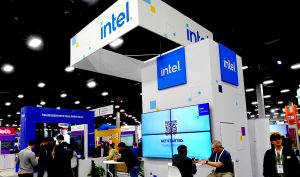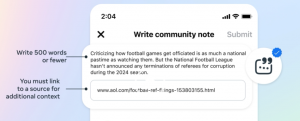Windows XP Retiring In Time For Microsoft Glasses – SiliconANGLE News Roundup
A Big Day For Microsoft
After eleven long years of success, Microsoft will finally stop supporting Windows XP.
![]() In exactly one year from today, technical support and updates for the OS will go offline, and Microsoft is warning companies to take this next year to begin migrating their systems to Windows 7. Though many have seen this day coming for a while, Microsoft says that fewer than half of all large organizations have made the transition, and some sources say that fewer than one-in-four companies are fully transitioned.
In exactly one year from today, technical support and updates for the OS will go offline, and Microsoft is warning companies to take this next year to begin migrating their systems to Windows 7. Though many have seen this day coming for a while, Microsoft says that fewer than half of all large organizations have made the transition, and some sources say that fewer than one-in-four companies are fully transitioned.
Though there’s many reasons why companies have not already switched to Windows 7, business costs were the biggest reason companies cited for not switching. This move by Microsoft, forces businesses to make the transition immediately, as the lack of technical support and decreased security could be far more costly to a business than upgrading an aged computer system.
More and more companies will be scrambling to make the necessary updates, as April 8th 2014 grows closer.
Speaking of Microsoft, move over, Google Glass, there’s a new head-mounted computer maker in town! Microsoft is the latest technology company said to be working on a wearable-computing device.
![]() Unlike the rumored iWatch device, said to be in production at Apple, analysts suspect that Microsoft is developing a glasses-based device. A wearable-computing device push by all three companies might be enough to get consumers to adopt the new trend. Microsoft’s investment in the technology that powers the Kinect could prove useful in its wearable computing product.
Unlike the rumored iWatch device, said to be in production at Apple, analysts suspect that Microsoft is developing a glasses-based device. A wearable-computing device push by all three companies might be enough to get consumers to adopt the new trend. Microsoft’s investment in the technology that powers the Kinect could prove useful in its wearable computing product.
A pair of Microsoft connected-lenses might respond to hand-based gestures, rather than requiring users to tap on a touchpad. Relying on gestures, interpreted by a built in camera, could allow for a device that’s more sleek, and lower profile, than what we’ve seen with Google Glass. It’s been suggested that Microsoft is building an exciting prototype device, in the hopes that third party device-makers like Samsung will build their own versions.
Microsoft’s Surface hardware is an example of the company attempting to motivate third party companies into licensing its software for its own devices.
In The Ever-Changing World Of Mobile…
The fake Twitter account business is thriving. During last year’s Presidential election, the fake Twitter account business made headlines when it was discovered that Mitt Romney’s Twitter account gained over one-hundred-thousand followers in a matter of days. Since then, the Twitter-bot industry has grown, and become even more sophisticated.
![]() In many cases, it’s difficult to differentiate between a real Twitter user and a robot. It’s estimated that as many as twenty-million fake Twitter followers exist, inflating the follower counts of the Twitter users who pay for them. False accounts can be obtained for as little as five dollars for one thousand followers. Today’s complex Twitter-bots can be programmed to automatically re-tweet content, making them seem all the more life-like.
In many cases, it’s difficult to differentiate between a real Twitter user and a robot. It’s estimated that as many as twenty-million fake Twitter followers exist, inflating the follower counts of the Twitter users who pay for them. False accounts can be obtained for as little as five dollars for one thousand followers. Today’s complex Twitter-bots can be programmed to automatically re-tweet content, making them seem all the more life-like.
Experts suggest that the problem will most likely persist, until Twitter adopts more stringent account creation rules, as Facebook has done.
HTC’s Troubles Growing By The Day
The financial numbers are in for HTC, and they paint a bleak picture for the handset maker.
The firm reported the lowest quarterly profit on record. HTC saw a staggering 98-percent drop in income. The once prominent phone maker has been frank in its assessment of the problem. The company blamed new product delays on its inability to receive sufficient quantities of device components.
They explained that they no longer receive priority status from suppliers. Executives looking to make a comeback have their hopes pinned on two handsets.
The critically acclaimed HTC One will be available later this month, after a number of delays. Its craftsmanship is said to rival the latest iPhone. The other smartphone on the horizon is the HTC First. Just announced last week, the HTC First is the result of a partnership with Facebook. It will be the first phone to feature Facebook’s new social application layer, Facebook Home. Some analysts have expressed doubt about the ability of two phones to turn things around for HTC.
![]() Beyond Facebook fans, the HTC First might be popular to another subset of users.
Beyond Facebook fans, the HTC First might be popular to another subset of users.
The device’s claim to fame is Facebook Home and will be the first smartphone to feature Facebook’s new social application layer. However, the HTC First might also be exciting to those fond of the stock Android OS. HTC phones usually come with HTC Sense, a custom Android skin that can’t be removed.
When the HTC First ships later this month, users can disable Facebook Home and enjoy the skinless version of Android. It will be the first HTC device without Sense since the G2 in 2010. The HTC First, which comes in a variety of colors, and includes a built in FM radio, will be available for ninety-nine dollars. It will be sold exclusively by AT&T starting on April 12th.
Firefox Has Plans For Monetizing OS
In an ambitious move, Mozilla wants to make purchasing goods and services on the web easier than ever before. A new JavaScript API, appearing on Firefox OS will be similar to Google’s Wallet service, but modified with additional features that should make mobile purchases on the Firefox Phone much easier.
To start off, the new API will allow users to make payments from multiple sources, and more importantly, Mozilla wants to allow users of the Firefox OS to conveniently pay for online transactions through their carriers.
Though there’s been no confirmation that mobile carriers will support the plan, Mozilla is selling the idea as a way for carriers to have more control over customer relationships. If successfully implemented, the API’s micropayment abilities will also enable content providers to deliver paid, ad-free content more effectively, adding even more value to the idea. Currently the API is in the experimental stage, but with the support of service and content providers, Mozilla’s payment API could become an industry standard before we know it.
Who Needs Directions?
Add Google Maps to the list of things not allowed while driving. A court in California has upheld the citation of an individual who was using a map app to get directions while driving.
![]() The law in question is written broadly. It states that “a person shall not drive a motor vehicle while using a wireless telephone unless that telephone is specifically designed and configured to allow hands-free listening and talking, and is used in that manner while driving.”
The law in question is written broadly. It states that “a person shall not drive a motor vehicle while using a wireless telephone unless that telephone is specifically designed and configured to allow hands-free listening and talking, and is used in that manner while driving.”
The defendant argued that the law applied to voice calls, pointing out that a statute was added later to include texting as well. The judge decided that the spirit of the law was to forbid distracted driving. With this broad interpretation, one could potentially receive a citation for doing anything with a smartphone while driving.
Had the driver been using an iPad, or a physical map, there wouldn’t have been an issue. The law specifically targets drivers distracted by telephones.
In Other Tech News Today
Along with their new 4K LED televisions, Sony has announced details about their 4K media player set for release this Summer. Though the device looks like the same hockey-puck-like prototype we saw at this year’s CES, the real news is coming from Sony’s price point, and the 10-film bundle that will come with their new media player.
Critics are calling the seven-hundred dollar price tag a bit high for a video player. The film bundle that comes with Sony’s 4K player also looks disappointing, considering Sony’s extensive media library. To make things worse, it’s not very likely that early adopters will be satisfied with the device, as Sony’s video distribution service will not be available until the Fall.
Either way, once the service goes online, expect to see more of Sony’s lineup, along with movies from other notable production houses, in full 4K resolution.
Zynga executives are finding themselves in a bind thanks to a lawsuit filed against them.
Former project manager, Wendy Lee, is heading the charge against her former employers, accusing them of unfair business practices following the company’s initial public offering. The IPO’s terms restricted the sale of stocks for a 165 days following the initial offering, however this restriction was ignored by some executives.
Only three months into the lockup, certain company executives sold more than forty-million shares, which earned them more than two-hundred million dollars. By the time the lockup had expired, the Zynga share price had dropped nearly fifty percent, effectively robbing lower-level employees of fair market trading values.
Though the case is still pending trial, Wendy Lee and other employees will certainly be asking the court to order those who benefited from early sales to pay damages.
That’s all for the news today, and for those of you who want to keep up with what’s coming out next, don’t forget to watch us on the morning NewsDesk with Kristin Feledy.
photo credit: milkfish via photopin cc
photo credit: Comicbase via photopin cc
photo credit: liewcf via photopin cc
photo credit: JcOlivera.com via photopin cc
photo credit: Scott Beale via photopin cc
A message from John Furrier, co-founder of SiliconANGLE:
Your vote of support is important to us and it helps us keep the content FREE.
One click below supports our mission to provide free, deep, and relevant content.
Join our community on YouTube
Join the community that includes more than 15,000 #CubeAlumni experts, including Amazon.com CEO Andy Jassy, Dell Technologies founder and CEO Michael Dell, Intel CEO Pat Gelsinger, and many more luminaries and experts.
THANK YOU













